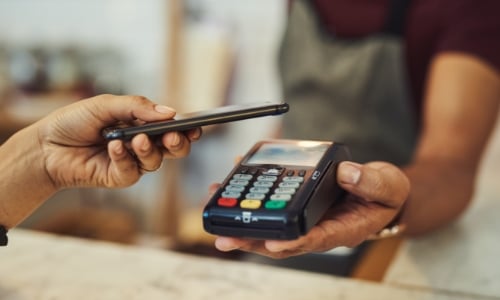
It's OK if you don't know much about mobile payments. This guide will make you a pro in no time. Whether you have an iPhone or Android device, you can make mobile payments.
What is a mobile payment system?
Apple, Google, and Samsung have all created mobile payments and wallets within the last five years. These services are known as Apple Pay, Android Pay, and Samsung Pay, respectively.
Here's how it works: You scan your debit or credit card from a participating bank onto your phone and a digital version is created. When you head to a store with a contactless payment terminal, your phone acts as the payment method, and your fingerprint is the authorization. If you have multiple cards, you can even select which one to use at checkout.
It's that easy and better yet, it's quick. Payments usually go through in seconds. In fact, The Wall Street Journal reported that mobile payments take about six seconds to complete, whereas chip card readers average 15 seconds per transaction [1].
Yet, faster payments aren't the only benefit when you pay with your phone.
Mobile Payments are Safer
Security should always be on your mind when shopping in light of large breaches at retailers in recent years.
Mobile payments offer a level of security not previously seen because they operate differently from card terminals. While you digitalize your debit or credit card, your phone never actually uses your card's information during a transaction.
Instead, the mobile service generates a device-specific number and a unique transaction code, according to Apple, Google and Samsung. These tokens resemble card numbers but are worthless if stolen during a breach.
Your security is further strengthened because transactions can only be completed with your fingerprint.
And even if your phone is stolen, your payment information is still secured. You'll just need to de-register your cards from your Apple, Google or Samsung account.
You can Still Receive Store Benefits
You might be hesitant to make the switch to a mobile payment system because you're worried you'll miss out on store reward points.
You'll be delighted to know mobile wallets take full memberships at stores. Time Money also explained how you'll be reminded if a coupon you have is nearing its expiration date [2]. Services like Android Pay may even offer discounts for using the payment system with select services, such as Uber.
"You'll still enjoy perks on all purchases."
And it's not just store memberships; you'll still enjoy perks - like cash back on all purchases - and rewards when using your credit cards.
Head to a Store and use a Mobile Payment
Mobile payment terminals are becoming more popular across the country. Approximately 2 million merchants accept Android and Apple Pay, while almost every merchant accepts Samsung Pay because it's compatible with traditional card readers.
If you're unsure if mobile payments are accepted, look for a symbol with a hand holding a small square next to four curved lines. You can also find a list of merchants where mobile payments are accepted.
However, don't leave your home without your actual wallet. Mobile payment terminals may be broken, or you may buy an item from a cash-only establishment.
That's just about everything you need to know on mobile payments. The setup process is painless, and buying something with your phone can be truly magical.
Sources:
[1]. Chip Card Nightmares? Help Is on the Way
[2]. 5 Things to Know About Paying With Your Phone